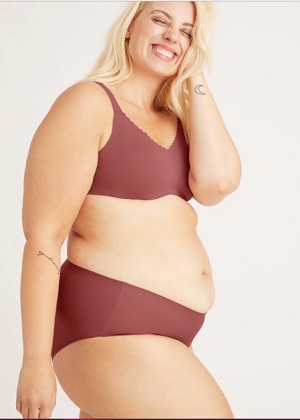
Embracing your postpartum body when you’re disabled
All mums out there can probably identify with body confidence struggles after being pregnant. But what about if you’re disabled too? Working with underwear store Knixs, which caters and celebrates all shapes and sizes, disabled mum Fiona Anderson talks about the coming to terms with a postpartum body and how mums can learn to love themselves.
It’s important to take notice of just how much of our lives we spend preening ourselves. From dying our hair all colours under the sun and trying a range of make-up styles, to who we associate ourselves with and what we choose to focus our efforts on long-term.
There are so many aspects we feel we need to get right in the pursuit of being happy with our life and body. There are always learning curves along the way, with our self-esteem dutifully getting knocked as we go. These can cause us to tread more carefully in the hopes one day we can turn ourselves into whatever ’perfect’ is.
Today, perfect seems to mean flawless skin viewed through filters on Snapchat and unnatural bodies photoshopped for Instagram. Before any images are shared on social media we feel we need a tucked-in waist, bigger bust and to erase any obvious signs of cellulite. That’s not forgetting the fake tan and pearly white teeth!
Even postpartum photos on social media can seem so far from realistic. Unless women hit the gym the day after birth and can afford a personal trainer – like our most iconic celebs – we have no chance of meeting this ‘ideal’!
However, if you have a disability, you can struggle with your body image and confidence in ways others can’t even fathom. For example, sitting in a wheelchair all day means our body shape is altered uncontrollably, highlighting a distended tum to a plump bum.

All of that is magnified when we have had a child. Going to the gym isn’t an option for a number of different reasons, such as the lack of accessibility or being unable to actually use the equipment from a wheelchair.
It also doesn’t help that trainers are often afraid to even try and tailor a workout plan due to ignorance about your condition and the fear of making matters worse.
Barriers like these can be tiresome and affect our mental wellbeing. That’s why it’s so important to find positive influences, particularly those happy to show their postpartum body without trying to rectify what the dislike.
Changing our perception of our body is the starting point of acceptance. Once we’ve embraced our body for all it is – Tigger stretch marks and all – things will all fall into place.
A quick search on Instagram reveals families similar to The Catch Poles – an unfiltered and hugely influential couple. Mum Lucy is a wheelchair user and Dad James is an amputee with a prosthetic leg and they have four children.
Then you have amazing campaigns, like the Knix Life After Birth, for example. Run by a group of brave mothers for Kinx, each showcases their post-pregnancy bodies in a bid to educate society that THIS is what bodies look like after childbirth and it is perfectly normal!
Lastly, Alex Dacy, aka Wheelchair Rapunzel is on a mission to show the world that disabled bodies are sexy and worthy.
These are just a snippet of role models out there to help you view your body as the perfection it is.
Your body is a vessel of bravery and longevity, it is such an amazing thing that we often take for granted. Perfect in every way, even if you cannot see it. It’s been there for you through thick and thin, now it’s time you look after it by redefining what perfection is – you.
By Fi Anderson with Kinx
More on Disability Horizons…